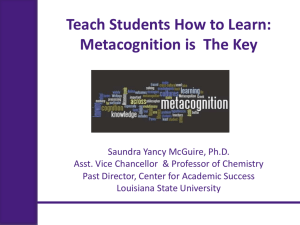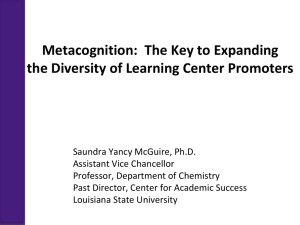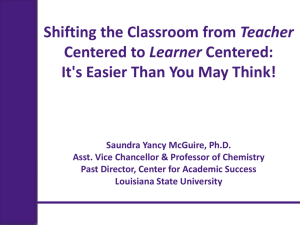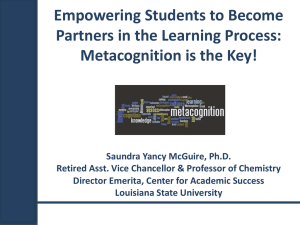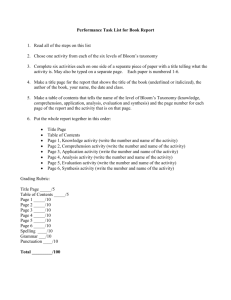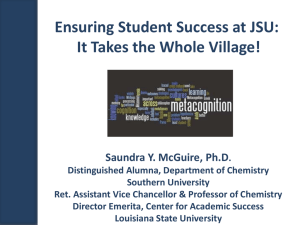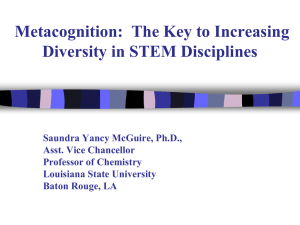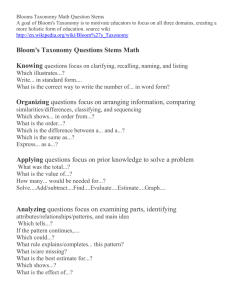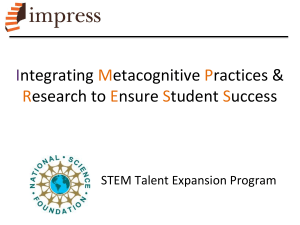Metacognition Presentation - Faculty Colloquium on Excellence in
advertisement
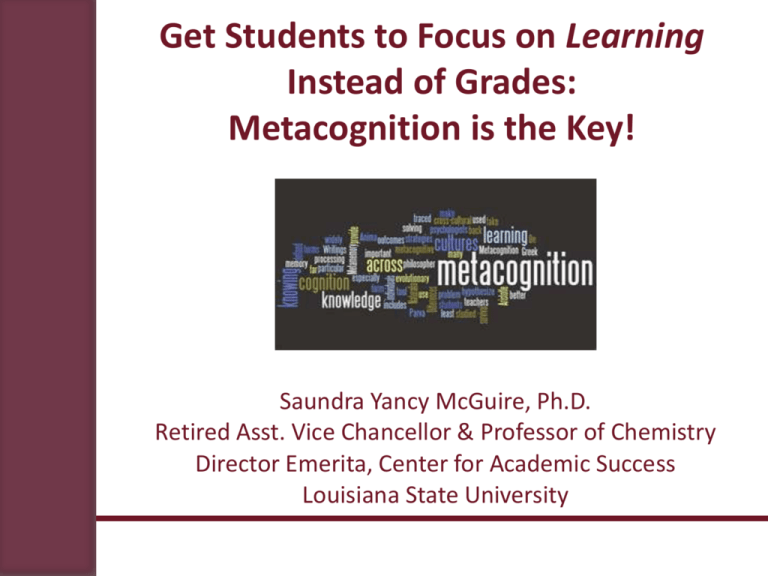
Get Students to Focus on Learning Instead of Grades: Metacognition is the Key! Saundra Yancy McGuire, Ph.D. Retired Asst. Vice Chancellor & Professor of Chemistry Director Emerita, Center for Academic Success Louisiana State University The mission of Indiana University Kokomo… is to enhance the educational and professional attainment of the residents of North Central Indiana by providing a wide range of bachelor's degrees, and a limited number of master's and associate degrees. Indiana University Kokomo is further dedicated to enhancing research, creative work, and other scholarly activity and to strengthening the economic and cultural vitality of the region through a variety of partnerships and programs. 2004 National College Learning Center Association Frank L. Christ Outstanding Learning Center Award Indiana University Kokomo Student Success Center 20?? NCLCA F.L. Christ Outstanding Learning Center Desired outcomes • We will understand why students spend little time studying and do not know how to learn • We will have concrete learning strategies that faculty can teach students to increase learning, and we will be committed to trying them • We will have more resources for our students • We will view our students differently • We will see positive changes in our students’ performance and self-perception • We will spend time reflecting on improving our teaching and our students’ learning Metacognition The ability to: think about one’s own thinking be consciously aware of oneself as a problem solver monitor, plan, and control one’s mental processing (e.g. “Am I understanding this material, or just memorizing it?”) accurately judge one’s level of learning Flavell, J. H. (1976). Metacognitive aspects of problem solving. In L. B. Resnick (Ed.), The nature of intelligence (pp.231-236). Hillsdale, NJ: Erlbaum But many students have not developed these abilities Arum, Richard and Roksa, Josipa. 2011. Academically Adrift: Limited Learning on College Campuses. Chicago: University of Chicago Press. But they can develop them if we… Teach students how to learn Help them develop the right mindset Why don’t most students know how to learn or how to study? According to data from the entering class of 2011...* • It wasn’t necessary in high school - 60.5% of 2011 (down from 63% in 2010) entering first year students spent less than six hours per week doing homework in 12th grade. - 49.7% of these students said they graduated from high school with an “A” average.* • Students’ confidence level is high - 70.9 % believe their academic ability is above average or in the highest 10 percent among people their age *2011 Higher Education Research Institute Study How do you think most students would answer the following? What did most of your teachers in high school do the day before the test? What did they do during this activity? What grade would you have made on the test if you had gone to class only on the day before the test? Faculty Must Help Students Make the Transition to College Help students identify and close “the gap” current behavior current grades productive behavior desired grades Reflection Questions • What’s the difference, if any, between studying and learning? • For which task would you work harder? A. Make an A on the test B. Teach the material to the class Turn Students into Expert Learners: Teach Them Metacognitive Learning Strategies! The Story of Three Students Travis, junior psychology student 47, 52, 82, 86 B in course Maryam, first year art student 57, 87 B in course Dana, first year physics student 80, 54, 91, 97, 90 (final) A in course How’d They Do It? They used metacognitive strategies They began thinking about their thinking They focused on learning instead of grades Travis, junior psychology student 47, 52, 82, 86 Problem: Reading Comprehension Solution: Preview text before reading* Develop questions* Read one paragraph at a time and paraphrase information *Develop anticipatory set Christopher Columbus Discovering America WITH HOCKED GEMS FINANCING HIM/ OUR HERO BRAVELY DEFIED ALL SCORNFUL LAUGHTER/ THAT TRIED TO PREVENT HIS SCHEME/ YOUR EYES DECEIVE/ HE HAD SAID/ AN EGG/ NOT A TABLE/ CORRECTLY TYPIFIES THIS UNEXPLORED PLANET/ NOW THREE STURDY SISTERS SOUGHT PROOF/ FORGING ALONG SOMETIMES THROUGH CALM VASTNESS/ YET MORE OFTEN OVER TURBULENT PEAKS AND VALLEYS/ DAYS BECAME WEEKS/ AS MANY DOUBTERS SPREAD FEARFUL RUMORS ABOUT THE EDGE/ AT LAST/ FROM NOWHERE/ WELCOME WINGED CREATURES APPEARED/ SIGNIFYING MOMENTOUS SUCCESS Dooling, J.D. and Lachman, R. Effects of Comprehension on Retention of Prose, Journal of Experimental Psychology, (1971), Vol. 88, No. 2, 216-222 Anticipatory set CAN interfere! Let’s look at the car on the next slide… Is this a 2-door or 4-door car? Maryam, freshman art student 57, 87 Problem: Not seeing the underlying structure of different types of art Solution: Focus on characteristics of different artists’ work in order to indentify the painter of an unfamiliar piece of art Dana, first year physics student 80, 54, 91, 97, 90 (final) Problem: Memorizing formulas and using www.cramster.com Solution: Solve problems with no external aids and test mastery of concepts Why the Fast and Dramatic Increase? It’s all about the strategies, and getting them to engage their brains! Counting Vowels in 45 seconds How accurate are you? Count all the vowels in the words on the next slide. Dollar Bill Dice Tricycle Four-leaf Clover Hand Six-Pack Seven-Up Octopus Cat Lives Bowling Pins Football Team Dozen Eggs Unlucky Friday Valentine’s Day Quarter Hour How many words or phrases do you remember? Let’s look at the words again… What are they arranged according to? Dollar Bill Dice Tricycle Four-leaf Clover Hand Six-Pack Seven-Up Octopus Cat Lives Bowling Pins Football Team Dozen Eggs Unlucky Friday Valentine’s Day Quarter Hour NOW, how many words or phrases do you remember? What were two major differences between the two attempts? 1. We knew what the task was 2. We knew how the information was organized Bransford, J.D., Brown, A.L., Cocking, R.R. (Eds.), 2000. How people learn: Brain, Mind, Experience, and School. Washington, DC: National Academy Press. What we know about learning • Active learning is more lasting than passive learning -- Passive learning is an oxymoron* • Thinking about thinking is important – Metacognition** • The level at which learning occurs is important – Bloom’s Taxonomy*** *Cross, Patricia, “Opening Windows on Learning” League for Innovation in the Community College, June 1998, p. 21. ** Flavell, John, “Metacognition and cognitive monitoring: A new area of cognitive– developmental inquiry.” American Psychologist, Vol 34(10), Oct 1979, 906-911. *** Bloom Benjamin. S. (1956). Taxonomy of Educational Objectives, Handbook I: The Cognitive Domain. New York: David McKay Co Inc. Bloom’s Taxonomy Anderson & Krathwohl, 2001 http://projects.coe.uga.edu/epltt/index.php?title=Bloom's_Taxonomy Bloom’s Taxonomy Making judgments based on criteria and standards through checking and critiquing. This pyramid depicts the different levels of thinking we use when learning. Notice how each level builds on the foundation that precedes it. It is required that we learn the lower levels before we can effectively use the skills above. Creating Evaluating Analyzing Carrying out or using a procedure through executing, or implementing. Breaking material into constituent parts, determining how the parts relate to one another and to an overall structure . Applying Understanding Retrieving, recognizing, and recalling relevant knowledge from long-term memory. Putting elements together to form a coherent or functional whole; reorganizing elements into a new pattern or structure through generating, planning, or producing. Constructing meaning from oral, written, and graphic messages through interpreting, exemplifying, classifying, summarizing, inferring, comparing, and explaining. Remembering http://www.odu.edu/educ/llschult/blooms_taxonomy.htm When we teach students about Bloom’s Taxonomy… They GET it! How students answered (2008) At what level of Bloom’s did you have to operate to make A’s or B’s in high school? 1. 2. 3. 4. 5. 6. Knowledge Comprehension Application Analysis Synthesis Evaluation 35% 25% 21% 13% 1 2 3 4 3% 3% 5 6 How students answered (2013) At what level of Bloom’s did you have to operate to make A’s or B’s in high school? 44% 1. 2. 3. 4. 5. 6. Knowledge Comprehension Application Analysis Synthesis Evaluation 29% 21% 4% 2% 0% 1 2 3 4 5 6 How students answered (in 2008) At what level of Bloom’s do you think you’ll need to be to make an A in Chem 1201? 1. 2. 3. 4. 5. 6. Knowledge Comprehension Application Analysis Synthesis Evaluation 35% 23% 15% 14% 7% 6% 1 2 3 4 5 6 How students answered (in 2013) At what level of Bloom’s do you think you’ll need to be to make an A in Chem 1201? 1. 2. 3. 4. 5. 6. Knowledge Comprehension Application Analysis Synthesis Evaluation 40% 23% 11% 11% 9% 6% 1 2 3 4 5 6 How do we teach students to move higher on Bloom’s Taxonomy? Teach them the Study Cycle* *adapted from Frank Christ’s PLRS system The Study Cycle 344 Reflect Review Reflect Preview Preview before class – Skim the chapter, note headings and boldface words, review summaries and chapter objectives, and come up with questions you’d like the lecture to answer for you. Attend Attend class – GO TO CLASS! Answer and ask questions and take meaningful notes. Review Review after class – As soon after class as possible, read notes, fill in gaps and note any questions. Study Assess Study – Repetition is the key. Ask questions such as ‘why’, ‘how’, and ‘what if’. • Intense Study Sessions* - 3-5 short study sessions per day • Weekend Review – Read notes and material from the week to make connections Assess your Learning – Periodically perform reality checks • Am I using study methods that are effective? • Do I understand the material enough to teach it to others? Intense Study Sessions Decide what you want to accomplish in your study session 1 Set a Goal 2 Study with Focus 30-50 min Interact with material- organize, concept map, summarize, process, re-read, fill-in notes, reflect, etc. 3 Reward Yourself 10-15 min Take a break– call a friend, play a short game, get a snack 4 Review 1-2 min 5 min Go over what you just studied Center for Academic Success B-31 Coates Hall ▪ 225.578.2872 ▪www.cas.lsu.edu Effective Metacognitive Strategies Always ask why, how, and what if Use SQ5R for reading assignments (survey, question, read, recite, review, wRite, reflect) Test understanding by giving “mini lectures” on concepts Always solve problems without looking at an example or the solution Use the Study Cycle with Intense Study Sessions Metacognitive Get Acquainted Activity* • What do you believe is important to understand and learn in _____________________? • What do you believe to be critical characteristics of successful students in ___________? • How will you study and prepare for exams in ______________________________? *Simpson, M. & Rush, L. (2012) in Teaching Study Strategies in Developmental Education, Hodges, Simpson, Stahl eds. New York: Bedford/St. Martin’s Hodges, Simpson, Stahl eds. (2012) Teaching Study Strategies in Developmental Education, New York: Bedford/St. Martin’s Historical Background on Study Strategies Developmental Education and Learning Assistance Today Diverse Populations in the Classroom Students’ Beliefs about Study Strategies Theory, Research, and Best Practices Assessment and Evaluation More Valuable References Gabriel, Kathleen F. (2008) Teaching Unprepared Students. Sterling, VA: Stylus Publishing Nilson, Linda. (2013) Creating Self-regulated Learners Sterling, VA: Stylus Publishing Effective Strategies for Teaching Unprepared Students* Establish High Expectations Emphasize Consistent Contact Interweave Assessment and Teaching Define Student Success Clarify Student Responsibility Establish a Learning Community of Scholars Meet Students Where They Are Help Students Determine Their Learning Style *Gabriel, Kathleen F. (2008) Teaching Unprepared Students. Sterling, VA: Stylus Publishing Are Learning Styles a Myth? http://itslifejimbutnotasweknowit.org.uk/files/LSRC_LearningStyles.pdf Or Can Learning Styles Help Students Learn? Date: Fri, Oct 19, 2012 at 4:35 PM Greg, Good news, I redeemed myself from my first physics exam bomb with a 99% on the exam I took the day after we spoke. I have been reading on the LSU site you gave me and I really like it. I took their right brain or left brain quiz designed to suggest what learning style best suits you and I landed 50/50 for right-left brain dominance, so that left me with a lot of suggestions... I've also made myself a new weekly schedule with 1 hour study blocks of all of my subjects in one day… Cutting out the cell phone and recreational internet during study time is something else I really like. Just wanted to give you an update and thank you again for the meeting. Best, Reg ************************************ Gregory S. Owens Associate Dean, College of Science 315 S. 1400 E. University of Utah Salt Lake City, UT 84112 ************************************ Where There is Agreement Faculty should use a wide variety of teaching methods, activities, and assessment techniques that will appeal to different types of learners Help Students Develop the Right Mindset Dweck, Carol, 2006. Mindset: The New Psychology of Success. New York: Random House Publishing Shenk, David, 2010. The Genius in All of Us: Why Everything You've Been Told About Genetics, Talent, and IQ Is Wrong. New York: Doubleday Mindset* is Important! Fixed Intelligence Mindset Intelligence is static You have a certain amount of it Growth Intelligence Mindset Intelligence can be developed You can grow it with actions Dweck, Carol (2006) Mindset: The New Psychology of Success. New York: Random House Publishing Responses to Many Situations are Based on Mindset Fixed Intelligence Mindset Response Growth Intelligence Mindset Response Challenges Avoid Embrace Obstacles Give up easily Persist Tasks requiring effort Fruitless to Try Path to mastery Ignore it Learn from it Threatening Inspirational Criticism Success of Others What happens when we teach metacognitive learning strategies, Bloom’s Taxonomy, and the Study Cycle to an entire class, not just individuals? Performance in Gen Chem I in 2010 Based on One Learning Strategies Session Exam 1 Avg.: Exam 2 Avg.: Final course Avg*.: Final Course Grade: Attended 72.35% 76.01% 82.48% B Absent 70.11% 68.74% 72.61% C Even one 50-min presentation on study and learning strategies may mean an improvement of one full letter grade! Note: 15% of the final course grade was determined by homework; students could also earn ~5% for extra credit activities. Performance in Gen Chem I in 2011 Based on One Learning Strategies Session Exam 1 Avg.: Exam 2 Avg.: Final course Avg*.: Final Course Grade: Attended 71.65% 77.18% 81.60% B Absent 70.45% 68.90% 70.43% C The one 50-min presentation on study and learning strategies again resulted in an improvement of one full letter grade! Note: 15% of the final course grade was determined by homework; students could also earn ~5% for extra credit activities. Presenting the data from the past helps students “get it”, and motivates some students to change their learning strategies Question to Students: Which One of the Next Two Slides More Accurately Describes YOUR Actions Before Test 1? Top 5 Reasons Folks Students Did NOT Do Well: 1. Didn’t spend enough time on the material 2. Started the homework too late 3. Didn’t memorize the information I needed to memorize 4. Did not use the book 5. Assumed I understood information that I had read and re-read, but had not applied Top 5 Reasons Folks Made an A on Test 1: • 1. Did preview-review for every class • 2. Did a little of the homework at a time • 3. Used the book and did the suggested problems • 4. Made flashcards of the information to be memorized • 5. Practiced explaining the information to others Students Attribution of Failure Prior to Learning Strategies Session* • I studied but blanked out during (the) exam. I thought I knew it but I didn’t. It made perfect sense on the board (during lecture), but not when I did it (in the exam). I couldn’t figure out why I didn’t know it. • There were not examples of problems like the ones on the test. I have never seen these problems before. (There were) a few problems (that) were never introduced in class. • You (the instructor) went through materials fast in lecture, and people answered (questions) quickly (so) I didn’t follow. * From Prof. Ningfeng Zhao, East Tennessee State Univ. Students Attribution of Failure After Learning Strategies Discussion* • • • • I was using the examples to do the problems I was studying and not trying to learn I wasn’t trying to teach the material “I see I was doing this to myself!” * From consultations with students at LSU Email from an EE Professor at New Mexico State Univ. Received on 10/22/2013 At the end of a 60 minute learning strategies presentation by the professor, students were given a survey to determine their self-assessment whether they were using or not using the strategies. The average scores of the different groups on the first two exams are shown below. Reported Use of Strategies Exam 1 Exam 2 Did not use the strategies 58 54 Used metacognitive strategies 95 80 Changes Faculty Have Made that Improved Learning and Performance • Provide learning strategies information to students after Test 1, and tell them about mindset (Psychology Professor at Southern Crescent Technical College, 2013) • Increase the frequency of tests from three per semester to biweekly (Mathematics Professor at Miles College, 2013) • Have students determine their learning style and write reflection on how they will use the information (Entomology Professor at LSU, 2009) • Present one 50 minute session on metacognition, Bloom’s Taxonomy, and the Study Cycle (Chemistry Professor at Middle Tennessee State University, 2012) • Teach students how to read (Chemistry Professor at LSU, 2004) Data from Psych Prof at Crescent Tech CC Received on 1/8/2014 Sample of 9 “at risk” students Exam 1 Exam 2 Exam 3 Exam 4 Final Exam 62.67 77.00 78.20 82.00 82.6 “The final exam was comprehensive. The students were placed in teams and each team was assigned three chapters to review to the class in preparation for the final exam.” Metacognition: An Effective Tool to Promote Success in College Science Learning* Ninfeng Zhao1, Jeffrey Wardeska1, Saundra McGuire2, Elzbieta Cook2 1Department of Chemistry, East Tennessee State University 2Department of Chemistry, Louisiana State University *Accepted for publication April 2013 Email from a Spring 2011 Chem 1201 student “…Personally, I am not so good at chemistry and unfortunately, at this point my grade for that class is reflecting exactly that. I am emailing you inquiring about a possibility of you tutoring me.” April 6, 2011 --------------------------------------------------------------------------------“I made a 68, 50, (50), 87, 87, and a 97 on my final. I ended up earning a 90 (A) in the course, but I started with a 60 (D). I think what I did different was make sidenotes in each chapter and as I progressed onto the next chapter I was able to refer to these notes. I would say that in chemistry everything builds from the previous topic. May 13, 2011 Semester GPA: 3.8 LSU Analytical Chemistry Graduate Student’s Cumulative Exam Record 2004 – 2005 2005 – 2006 9/04 Failed 10/05 Passed 10/04 Failed 11/05 Failed 12/05 Passed best in group 1/06 Passed 2/06 Passed Began work with CAS and the Writing Center in October 2005 11/04 Failed 12/04 Failed 1/05 Passed 2/05 Failed 3/06 Failed 3/05 Failed 4/06 Passed last one! 4/05 Failed 5/06 N/A Dr. Algernon Kelley, December 2009 From a Xavier University student to Dr. Kelley in Fall 2011 Oct. 17, 2011 Hello Dr. Kelley. … I am struggling at Xavier and I REALLY want to succeed, but everything I've tried seems to end with a "decent" grade. I’m not the type of person that settles for decent. What you preached during the time you were in Dr. Privett's class last week is still ringing in my head. I really want to know how you were able to do really well even despite your circumstances growing up. I was hoping you could mentor me and guide me down the path that will help me realize my true potential while here at Xavier. Honestly I want to do what you did, but I seriously can't find a way how to. Can I please set up a meeting with you as soon as you’re available so I can learn how to get a handle grades and classes? Oct. 24, 2011 Hey Dr. Kelley, I made an 84 on my chemistry exam (compared to the 56 on my first one) using your method for 2 days (without prior intense studying). Thanks for pointing me in the right direction. I’ll come by your office Friday and talk to you about the test. Nov 3, 2011 Hey Dr. Kelley! I have increased my Bio exam grade from a 76% to a 91.5% using your system. Ever since I started your study cycle program, my grades have significantly improved. I have honestly gained a sense of hope and confidence here at Xavier. My family and I are really grateful that you have taken time to get me back on track. Teaching and Learning Strategies That Work SCIENCE , VOL 325 4 SEPTEMBER 2009 www.sciencemag.org ROALD HOFFMANN1* AND SAUNDRA Y. MCGUIRE2 1Department of Chemistry and Chemical Biology, Cornell University, Baker Laboratory, Ithaca, NY 14853, USA. 2Center for Academic Success and Department of Chemistry, Louisiana State University, Baton Rouge, LA 70803, USA. September-October 2010 Volume 98, Number 5 MARGINALIA Learning and Teaching Strategies Roald Hoffmann and Saundra Y. McGuire We can significantly increase student learning! We must teach students the learning process and provide specific strategies We must not judge student potential on initial performance We must encourage students to persist in the face of initial failure We must encourage the use of metacognitive tools Final Reflection Questions Who is primarily responsible for student learning? a) the student b) the instructor c) the institution Who do you think students say is primarily responsible for student learning? a) the student b) the instructor c) the institution The reality is that… when all three of these entities take full responsibility for student learning, we will experience a significant increase in student learning, retention, and graduation rates! Special Note Please visit the CAS website at www.cas.lsu.edu. We have on-line workshops that will introduce you and your students to effective metacognitive strategies. Please feel free to contact me at smcgui1@lsu.edu. Have fun teaching your students powerful metacognitive strategies! Saundra McGuire Useful Websites • • • • • • http://ssc.nmsu.edu/ www.cas.lsu.edu www.howtostudy.org www.vark-learn.com www.drearlbloch.com Searches on www.google.com Reflection Activity Select one or two learning strategies that you can teach to your class/students, and develop a plan to do this. Additional References • Bruer, John T. , 2000. Schools For Thought: A Science of Learning in the Classroom. MIT Press. • Bransford, J.D., Brown, A.L., Cocking, R.R. (Eds.), 2000. How people learn: Brain, Mind, Experience, and School. Washington, DC: National Academy Press. • Christ, F. L., 1997. Seven Steps to Better Management of Your Study Time. Clearwater, FL: H & H Publishing • Cromley, Jennifer, 2000. Learning to Think, Learning to Learn: What the Science of Thinking and Learning Has to Offer Adult Education. Washington, DC: National Institute for Literacy. • Ellis, David, 2006. Becoming a Master Student*. New York: HoughtonMifflin. • Hoffman, Roald and Saundra Y. McGuire. (2010). Learning and Teaching Strategies. American Scientist , vol. 98, pp. 378-382. • Nilson, Linda, 2004. Teaching at It’s Best: A Research-Based Resource for College Instructors. Bolton, MA: Anker Publishing Company. • Pierce, William, 2004. Metacognition: Study Strategies, Monitoring, and Motivation. http://academic.pg.cc.md.us/~wpeirce/MCCCTR/metacognition.htm *Excellent student reference
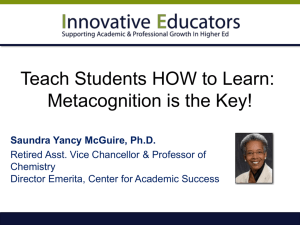
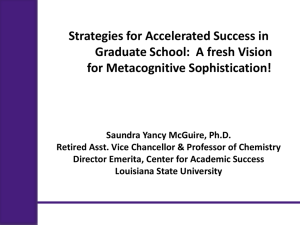
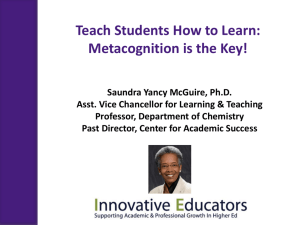
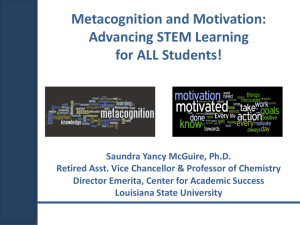
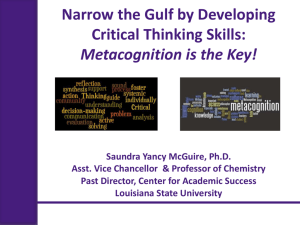
![File [ptx] - Kent State University](http://s3.studylib.net/store/data/009471766_1-c9863c0101d52ef451e19680e4b3f848-300x300.png)
